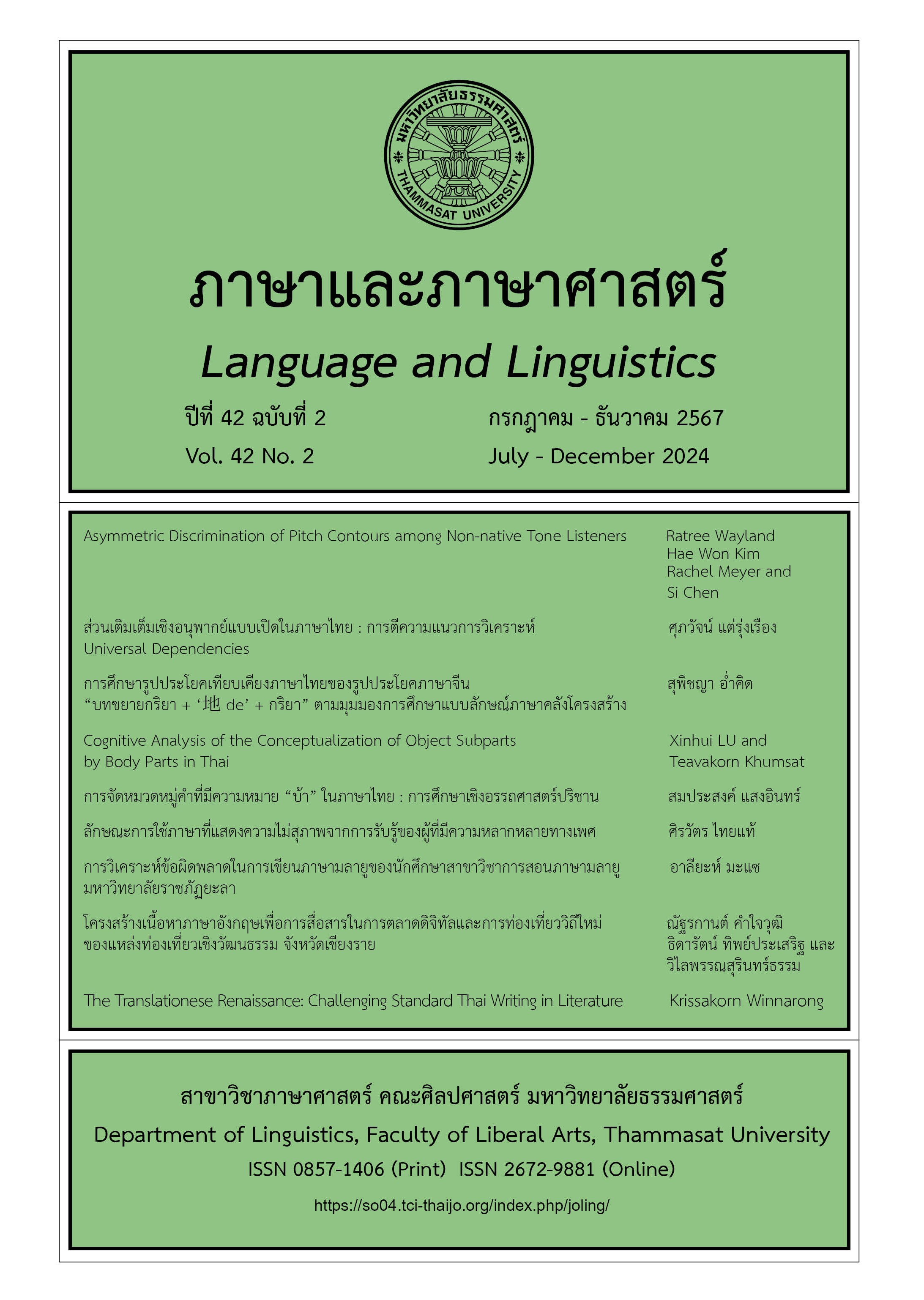Linguistic Features of Impoliteness Language from an LGBTIQ Perspective
Main Article Content
Abstract
The presence of sexual diversity is one significant cause of discrimination in society, as observed by negative language patterns directed at the LGBTIQ community. This research aims to analyze offensive words, phrases, and utterances that negatively impact the mental well-being of Thai LGBTIQ individuals by adapting “rapport management” as a framework. Data were collected through interviews with 60 gender-diverse Thai speakers, aged between 18 and 60. The interviews focused on words and phrases that affect mental well-being in real-life conversations, covering experiences from the past to the present. The study found that offensive language is prevalent in society and significantly harms LGBTIQ individuals. The analysis also revealed that such language often results in face loss. The study demonstrates that impolite language, including insults, ridicule, embarrassment, and snubbing, has a significant negative impact on both the mental well-being and social interactions of LGBTIQ individuals, affecting their overall mental health and social experiences in daily life.
Article Details

This work is licensed under a Creative Commons Attribution-NonCommercial-NoDerivatives 4.0 International License.
บทความทุกบทความเป็นลิขสิทธิ์ของภาษาและภาษาศาสตร์
References
กัญจิรา วิจิตรวัชรารักษ์, พระมหาอรุณ ปญญารุโณ, และ สุพัตรา สันติรุ่งโรจน์. (2562).
ขบวนการเคลื่อนไหวทางสังคมของกลุ่มผู้ที่มีความหลากหลายทางเพศในประเทศไทย. วารสารมหาจุฬานาครทรรศน์, 6(8), 3758-3772.
กฤษณ์ อริยะพุทธิพงศ์. (6 กรกฎาคม 2560). การคุกคามโดยภาพเหมารวม. https://www.psy.chula.ac.th/th/feature-articles/stereotype-threat
ชเนตตี ทินนาม, โกสุม โอมพรนุวัฒน์ และ รัตนา ด้วยดี. (2564). ยุทธศาสตร์สุขภาวะ LGBTIQN+ ในประเทศไทย (พิมพ์ครั้งที่ 1). เดือนตุลา.
ทรงธรรม อินทจักร. (2557). ความสำคัญของการยับยั้งเจตนาในความสุภาพปลดพันธนาการ. ภาษาและภาษาศาสตร์, 32(2). 25-50.
ทรงธรรม อินทจักร. (2558). การกล่าวความจริงและการโกหกจากมุมมองวัจนปฏิบัติศาสตร์ข้ามวัฒนธรรม. ภาษาและภาษาศาสตร์, 33(2), 1-24.
นฤพนธ์ ด้วงวิเศษ. (2563). แนวคิดเรื่อง “ความหลากหลายทางเพศ” ในกระบวนทัศน์วิทยาศาสตร์และสังคมศาสตร์. วารสารวิชาการมนุษยศาสตร์และสังคมศาสตร์ มหาวิทยาลัยบูรพา, 28(3), 312-339.
ปัญญา สุภาจารย์. (2563). ความสัมพันธ์ระหว่างภาษากับอุดมการณ์ในวาทกรรม “ความหลากหลายทางเพศ” กรณีการนำเสนอประเด็นข่าว “เต็งหนึ่งเปิดตัวเป็นเกย์”. วารสารอักษรศาสตร์ มหาวิทยาลัยศิลปากร, 42(2), 164-190.
รัฐธรรมนูญแห่งราชอาณาจักรไทย พ.ศ. 2560. (6 เมษายน 2560). ราชกิจจานุเบกษา. เล่ม 134 ตอนที่ 40 ก. หน้า 1-90.
รณภูมิ สามัคคีคารมย์. (2563). คู่มือการปฏิบัติงานสื่อในการนำเสนอประเด็นความหลากหลายทางเพศ. ภาพพิมพ์.
วาลี ปรีชาปัญญากุล. (2563). ภาษาและอัตลักษณ์ของพิธีกรเพศที่สามที่ปรากฏผ่านรายการโทรทัศน์. วารสารวิทยาการจัดการ มหาวิทยาลัยราชภัฏเชียงราย, 15(2), 143-163.
สำนักงานคณะกรรมการสุขภาพแห่งชาติ. (8 ธันวาคม 2564). การขจัดการเลือกปฏิบัติเพื่อความเป็นธรรมระหว่างเพศ. https:/nationalhealth.or.th/node/3481
อรรถกร สมแวง, ดุสิตา พึ่งสำราญ, สุรีย์พร พันพึ่ง, นิพนธ์ ดาราวุฒิมาประกรณ์, และพงษ์ศักดิ์ สกุลทักษิณ. (2566). ปัจจัยที่มีความสัมพันธ์ต่อความรอบรู้ด้านสุขภาพของผู้มีความหลากหลายทางเพศ. วารสารโรคเอดส์, 35(2), 86-100.
ฮาซันอักริม ดงนะเด็ง, สร้อยสุดา ทีฆาพล, ผอบพลอย ศศิรัศมิ์, ปณดา ช่วยแท่น, สุติมา กำพล, บุสริน หมัดเจริญ, และ เทพยุดา เฝื่อคง. (2564). ความต้องการด้านสิทธิของกลุ่มผู้มีความหลากหลายทางเพศ: กรณีศึกษานักศึกษามหาวิทยาลัยสงขลานครินทร์ วิทยาเขตตรัง. วารสารมนุษยศาสตร์และสังคมศาสตร์ มหาวิทยาลัยราชภัฏสงขลา, 3(2), 1-30.
Brown, P., & Levinson, S. C. (1987). Politeness: Some universals in language usage. Cambridge University Press.
Culpeper, J. Marti, L., Mei, M., Nevala, M., & Schauer, G. (2010). Cross-cultural variation in the perception of impoliteness: A study of impoliteness events reported by students in England, China, Finland, Germany, and Turkey. Intercultural Pragmatics, 7(4), 597-624
Gadavanij, S. (2021). Gender identification in language other than Mother-tongue: A case of non-Thai listeners deciphering a Thai male speaker’s gender. Manusya: Journal of Humanities, 24(1), 126-145.
Holmes, J. (1986). Compliments and compliment responses in New Zealand English. Anthropological Linguistics, 28(4), 485-508.
Spencer-Oatey, H. (Ed.). (2008). Culturally speaking: culture, communication and politeness theory (2nd ed.). Continuum.
Umera-Okeke, N. (2012). Linguistic sexism: An overview of the English language in everyday discourse. AFRREV LALIGENS: An International Journal of Language, Literature and Gender Studies, 1(1), 1-17.


